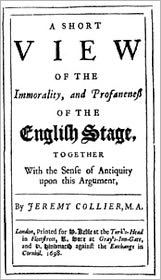Short View of the Immorality and Profaneness of the English Stage
A Short View of the Immorality and Profaneness of the English Stage. Together with the Sense of Antiquitiy upon this argument ( German A brief reflection on the immorality and godlessness of the English stage, along with the view of antiquity on the subject) is a diatribe against the theater, the Puritan clergyman Jeremy Collier wrote in 1698.
Collier attacks mainly the then very popular Restoration comedy "Love for Love" ( 1695) by William Congreve and "The Relapse " ( 1696 ) by John Vanbrugh. But other authors to William Shakespeare and John Dryden, he vehemently criticized.
Colliers accusation of immorality is primarily aimed at the lack of poetic justice and exemplary morals of the Restoration comedy. He sets out in detail that all people of the pieces are characteristically depraved and immoral, and he accuses the authors concluded that they had not only refrained from these characters deliver a punishment, but that they would also often rewarded for their behavior.
The accusation of impiety underpinned by Collier quotes from the pieces, the basis of which he showed how frequently exclamation like " Heaven! " ("! Heaven" ) or lawsuits against fate in the pieces appeared - accusations that are no longer comprehensible to a modern theater-goers and can only be understood against the background of that time. Collier cites no curses or open blasphemy that would have been tolerated at that time neither on stage nor in printed form.
Colliers How to use quotations current pieces in his application, was innovative for its time. He attracted much attention with his work and provoked a series of refutations. William Congreve replied necklace with long document Amendments of Mr. Collier's False and Imperfect Citations. Vanbrugh, however, refused to take Colliers attack seriously and set out in his brief and ironic answer letters A short Vindication of The Relapse and The Provok'd Wife From Immorality and Prophaneness about Collier funny, in which he accused him sensitive to the unflattering representation of churchmen to respond than on real godlessness.
Sometimes been said, ShortView have contributed significantly to the transformation of the British theater taste at the beginning of the 18th century. This change, however, had already begun before Collier published his writing. From today's perspective, the pamphlet is merely the written testimony of a social change since the permissive period under Charles II, to the demographic changes, the Glorious Revolution of 1688 and the rejection of the theater by William III. and Queen Mary had contributed.
- Literary work
- Literature ( English )
- Literature (17th century)
- Theater criticism
- Puritan










